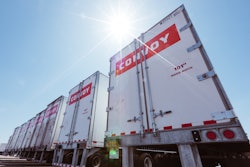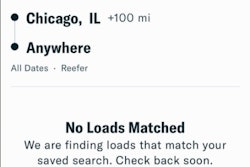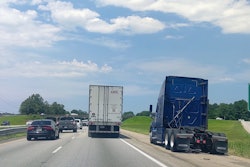Trucking news and briefs for Thursday, Oct. 19, 2023:
Trucking conditions lookback: 2023 hit low in August
It’s likely no surprise to owner-operators and fleets that August was not a good month for most in the trucking business.
 FTR's TCI reading for August was the worst since the beginning of the pandemic in April 2020.FTR
FTR's TCI reading for August was the worst since the beginning of the pandemic in April 2020.FTR
The firm noted that the index’s reading implies the toughest overall market conditions for carriers since the beginning of the COVID-19 pandemic in April 2020, adding that “surges in fuel prices tend to hurt small operations disproportionately, as they are less likely to benefit from fuel surcharges.”
[Related: If your trucking income's taken a beating this down cycle, you're not alone]
FTR added that while the outlook is for improved conditions, it doesn’t expect the index to turn consistently positive until late 2024.
“Market conditions for trucking companies look solidly negative through the first quarter of next year as we forecast no significant strengthening of capacity utilization or freight rates, and freight demand is stagnant,” said Avery Vise, FTR’s vice president of trucking. “A major question is whether consumer spending will remain as strong as it has been in the face of inflation, higher financing costs, and the resumption of debt service of student loan payments.”

Vise said freight demand isn’t likely to improve anytime soon, “so any near-term improvements in market conditions for carriers would likely come from a sharp drop in driver capacity.” Vise noted that while “small carriers continue to exit the market in high numbers,” those drivers are mostly being absorbed by larger carriers rather than leaving the industry altogether.
Ultimately, “diesel price volatility and the lack of any near-term strength in spot rates could accelerate carrier failures and tighten capacity,” Vise concluded.
[Related: How owner-operators can avoid joining the 'capacity reduction' ranks]
Specialized haulers petitioning Colorado to increase max weight for 9-axle trunnions
The Permit Subcommittee of the Colorado DOT’s Freight Advisory Council (FAC) met this week to consider a proposal to increase the state’s maximum weight limit for axle groups on a 9-axle “West Coast” trunnion trailer.
The proposal, brought forward by the Specialized Carriers and Rigging Association, requests Colorado increase its maximum weight limit to 60,000 pounds per axle group for these specific trailer types, harmonizing the state’s policy with most other states in its region.
SC&RA said in 2019 it successfully advocated for and won this axle group weight limit increase for trunnions in New Mexico. In the years since, New Mexico has reported a significant increase in permitted loads and revenue because of their permitting these configurations. In addition to Colorado, Utah and Oklahoma remain the only states in the region that do not yet allow this weight limit for West Coast trunnions.
The group said the increase recognizes the equivalent weight distribution the 9-axle trunnion configuration has with respect to the 13-axle tandem combination, also widely used, but operating at nearly 24 feet longer than the trunnion. The trunnion system can achieve such weight distribution at a shorter length by redistributing additional tires on independent axles that also provide additional load stability, SC&RA added.
[Related: The heaviest of hauls: Peek into 2022's biggest, baddest jobs by specialized carriers]
Trucker Path adds features aimed at safety for women truckers
The American Trucking Associations' Women in Motion group has formed a strategic partnership with Trucker Path in an effort to address some of the concerns of women truckers.
Through this new partnership, Trucker Path will be adding a number of features to its mobile app that will help women identify and locate facilities that have seven specific safety features including:
- Lighted parking
- Lighted bathroom access
- Lighted lounge areas
- Lighted shower facilities with 24/7 access
- Lighted laundry facilities with 24/7 access
- Round-the-clock maintenance
- On-site security
Facilities with all seven features will be marked with the Women in Motion logo. Drivers will also be able to provide updates on the condition of these amenities through the Trucker Path mobile app.
According to Trucker Path CMO Chris Oliver, user comments and stop reviews “serve as a valuable resource for fellow drivers -- both women and men."
[Related: Upcoming Women of Trucking Advisory Board allowing public comment]
W.W. Williams becomes authorized Allison Transmission distributor
Allison Transmission has appointed W.W. Williams as the authorized distributor for the Pacific Northwest, including the states of Washington, Alaska and parts of Oregon, Idaho and Northern California.
The territories include three parts and service facilities, a training center, and a network of 80-plus dealers. The company said it is up and running with a stock of inventory, assets to run the business, and a full staff for the region.
The territory expansion will report to David Ruff, W.W. Williams Divisional Vice President for the Southwest, Northwest and Mexico.









